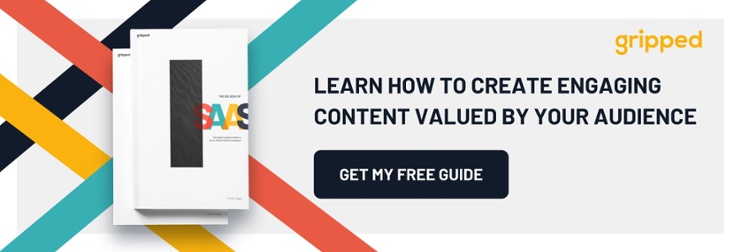Not all SaaS products are the same, and the specifics of how to invest in marketing will depend on your product itself. Enterprise B2B SaaS businesses need expert sales reps that can own accounts and win clients. They also need marketing to gain traction and provide insight, but require a bedrock of face-to-face skills to close deals.
For the majority of B2B SaaS, lower average contract values (ACVs) mean that creating volume-based sales funnels are critical. If you spend too much on customer acquisition, you can fail to recoup that value over a customer’s lifetime. This is a recipe for failure. In order to deliver value to the business you need to focus on inbound and repurposable marketing. Even for the high-end of the market, getting that right is fundamental to getting your foot in the door and building a sustainable relationship. Think about the specifics of your product. But, for every SaaS business, these four fundamentals need to be put in place in order to succeed.
Section 1:
Marketing depends on analytics (B2B SaaS or not)
Any sales and marketing strategy worth its salt should depend on data and analytics analytics. Without the ability to track what you are doing, you will be unable to improve. Building analytics capabilities should be one of your first priorities. You need someone on staff who can use tools such as Convertro, Google Analytics, Infer, Optimizely and DemandBase. To start with, this person can undertake different tasks as well. But, these are critical skills that you should look for in early sales and marketing hires.

The reliance on inbound and automated retargeting in much of the SaaS market makes this essential to improving sales processes. You need to be able to quantify and understand impressions and categorise those impressions into effective and ineffective sales journeys. There is no ‘gut’ that sales reps can rely on to improve their meetings. Invest early and invest heavily in analytics capabilities so that you understand what works and improve as you grow.
Section 2:
Content marketing brings people to your SaaS product
Content is critical to pulling in customers who have only just identified a problem or are investigating a product or service for the first time. Think about the last time you bought anything, did you go rushing to speak with a salesperson? Without content, you are nearly excluded from the modern buyer’s journey.

You need skilled writers that understand SEO principles and can craft content targeted at your buyer personas. Ideally, you should publish two blogs a week. It will likely take one person one-two days per week to choose topics, write the posts, create artwork and handle their basic social media promotion. This is, however, a long-term strategy. Content sticks around long after you paid for it to be written and only grows in visibility through interactions. This is one reason it is important to invest in content early.
You can either hire an in-house specialist, outsource the job to freelancers/agencies, or look for early marketing hires that can write and do other things.
Article continues below.
As a founder, you should consider writing one short blog article every week for your website. Once you can create a marketing team, you can make that the someone else’s job. However, still post many of them under your name, even if you entirely cease to be a writer. Those insights will have more weight coming from you, the CEO, than someone working in your marketing team. Temporarily partnering with an agency can allow you to quickly develop a bedrock of quality SEO material that is crafted for your ‘buyer personas’ across the ‘buyer’s journey’. You can then take over the task internally as you develop the revenue to hire specialists or grow the brand reputation allowing you to de-prioritise focus on the early stages of your marketing funnel.
Section 3:
Web design directs B2B customer journeys

You need a quality website. Because this is a one time job, it is often outsourced. But, you need access to people that can update landing pages, calls-to-action (CTAs), freemium content offers and your blog. You also need to keep track of backlinks and the ongoing health of your web presence using tools such as Ahrefs.
For blogs, particularly, you can make this easier on yourself by using a hosting platform such as HubSpot. For other aspects, like with analytics, you need to think about these technical skills when making your early hires. Investing in a digital specialist who can do all of these things will greatly improve your in-house capability. Again, agencies can help you temporarily spot check these problems and a great resource to companies just starting out.
Section 4:
Freemium and product trials are critical to SaaS
A free version of your product is critical to success. Luckily, getting this right is directly within your wheelhouse. The same people who helped you develop your product can help you build a free version. You just need to decide if freemium or a free trial is best suited to your product and market, and then craft something that both ‘wows’ free users and entices them into becoming paying customers. Make sure to get it right. Your entire marketing apparatus should be directed at getting people to your free trial. It is your main selling tool to entice them into becoming paying customers. Good luck!
Bonus:
Every B2B business needs to think about reselling
Reselling is critical to any business, this is particularly true in SaaS. Upselling alone accounts for 16% of new annual contract value (ACV) for the average SaaS business. However, for the largest SaaS sellers (those pulling in annual revenue in excess of £50 million) that number jumps to 28%, while the smallest SaaS companies only generate 11% of their ACV through upselling. Similar disparities are seen in all bands of annual revenue split between growth rates.
Customer acquisition costs are much lower for cross-selling and upselling — £0.22 per £1, rather than the average £0.92 spent to acquire £1 of new revenue. Re-selling is even cheaper, only £0.10 per £1. The larger your customer base, the more re-selling and upselling opportunities you have.
Your customers already know you, they already like your product, make sure that you are getting the most you can out of those relationships. SaaS founders need to put in place the foundations of upselling campaigns from the beginning in order to scale their business.

